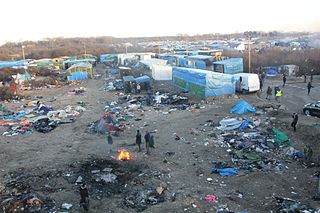Immigration Minister proposes removing benefits from failed asylum-seekers as more migrants try to cross to the UK via Calais
Following an increase in the number of attempts by the 3,000 or so migrants and refugees based in Calais to cross to the UK, Immigration Minster James Brokenshire has said he wants to "send out a very clear message" that Britain is not a soft touch on asylum.
 According to BBC News, Brokenshire said rules could be changed to remove benefit payments for more than 10,000 failed asylum-seekers living in the UK with their families.
According to BBC News, Brokenshire said rules could be changed to remove benefit payments for more than 10,000 failed asylum-seekers living in the UK with their families.
ITV News quoted Brokenshire as saying: "The UK has a proud history of offering sanctuary to those who need it, but failed asylum seekers who refuse to return home are illegal migrants, plain and simple."
"The current system shouldn't offer any perverse incentives for illegal migrants to lodge spurious asylum applications or encourage those without genuine claims for humanitarian protection to prolong their stay in the UK. It's unfair to those in genuine need of asylum and migrants who abide by our rules as well as to hard-working British taxpayers."
"I want to introduce new rules to support those who genuinely need it, but send out a very clear message to those who seek to exploit the system that Britain is not a soft touch on asylum."
In response, Lisa Doyle, the Refugee Council's head of advocacy, said that any decision to make families destitute was "morally reprehensible".
"We have grave concerns about the government's proposals to remove support from some of the most vulnerable families in the UK, many of whom fear there is real risk of serious harm or persecution to them and their children if returned to their countries of origin," she said.
Brokenshire's proposal comes as British and French governments warned in the wake of the situation in Calais that the world is facing a "global migration crisis".
Home Secretary Theresa May and France's Minister of the Interior Bernard Cazeneuve wrote in the Telegraph that tackling migration via Calais is the top priority for the UK and French governments.
The joint statement continued: "What we are currently facing is a global migration crisis. This situation cannot be seen as an issue just for our two countries. It is a priority at both a European and international level. Many of those in Calais and attempting to cross the Channel have made their way there through Italy, Greece or other countries. That is why we are pushing other member states – and the whole of the EU – to address this problem at root."
"The nations of Europe will always provide protection for those genuinely fleeing conflict or persecution. However, we must break the link between crossing the Mediterranean and achieving settlement in Europe for economic reasons."
The Guardian reported on Saturday that the Church of England made a "dramatic intervention" to deliver a stern rebuke to David Cameron for his "unhelpful" rhetoric on the migrant situation in Calais. Cameron had earlier spoken of a "swarm" of migrants crossing the Mediterranean, seeking a better life.
The bishop of Dover said: "We've become an increasingly harsh world, and when we become harsh with each other and forget our humanity then we end up in these standoff positions. We need to rediscover what it is to be a human, and that every human being matters."
The Refugee Council called Cameron's language "extremely inflammatory" and said he should instead use "responsible, careful language" that "doesn’t feed into people’s fears by misrepresenting the situation."
The bishop of Dover also attacked elements of the media for propagating a "toxicity" designed to spread antipathy towards migrants.
An editorial in the Mail on Sunday was strongly critical that migrants who had crossed from Calais were put up in "well-appointed hotels" with taxpayers' money. The Mail said migrants were given "their own hotel room, three cooked meals a day and a cash allowance of £35 a week" within days of arriving. The accommodation was needed as the UK's six dedicated immigration centres, built to accommodate 1,200 people, are full.
Writing in the Guardian in a piece entitled If you hate the migrants in Calais, you hate yourself, Nick Cohen warned that we are in danger of seeing "Fortress Britain" where "the Channel will become our Berlin Wall: a frontier guarded by paramilitary police and sniffer dogs."
"David Cameron does not even bother to pretend that Britain is a sanctuary any more. He has no need to lie and offer pious platitudes," Cohen wrote.
"People will flee dictatorship, oppression and climate change now, as they always have in the past … Human beings move. We are a restless species. If you have never moved to a new country to find work, your forebears certainly did. Go back far enough in your family, my family or any family on this planet and you will find that our common ancestors were migrants. In hating them, we hate ourselves."
Cohen also warned, however, that the "road to hell is paved with human rights lawyers' briefs" and said attempts to stop the deportations of Islamist preachers and foreign criminals has had the "profoundly illiberal effect of destroying what public support there was for welcoming refugees."